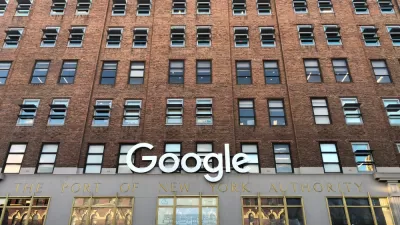New multibillion-dollar affordable housing commitments from leading tech firms may build out thousands of units, but that's nothing next to California's gargantuan housing shortage.

"The cost of housing has caused people to flee one of the hottest job markets in the nation, in one of the most beautiful places on earth," writes Conor Dougherty of the Golden State's housing crisis.
This year, Google, Apple, and Facebook have all thrown in billions of investment dollars to address the shortage. Though laudable, those efforts alone probably won't make much of a difference. One reason is the absurdly high cost of subsidized housing. A single unit in California averages around $450,000, and that figure balloons even higher in the big metros, Dougherty reports.
"Given those figures, the $4.5 billion that Google, Apple and Facebook have earmarked would create about 10,000 housing units." But against the state's housing deficit of roughly 3.5 million units, that's a pittance.
FULL STORY: Why $4.5 Billion From Big Tech Won’t End California Housing Crisis

Planetizen Federal Action Tracker
A weekly monitor of how Trump’s orders and actions are impacting planners and planning in America.

Maui's Vacation Rental Debate Turns Ugly
Verbal attacks, misinformation campaigns and fistfights plague a high-stakes debate to convert thousands of vacation rentals into long-term housing.

Restaurant Patios Were a Pandemic Win — Why Were They so Hard to Keep?
Social distancing requirements and changes in travel patterns prompted cities to pilot new uses for street and sidewalk space. Then it got complicated.

In California Battle of Housing vs. Environment, Housing Just Won
A new state law significantly limits the power of CEQA, an environmental review law that served as a powerful tool for blocking new development.

Boulder Eliminates Parking Minimums Citywide
Officials estimate the cost of building a single underground parking space at up to $100,000.

Orange County, Florida Adopts Largest US “Sprawl Repair” Code
The ‘Orange Code’ seeks to rectify decades of sprawl-inducing, car-oriented development.
Urban Design for Planners 1: Software Tools
This six-course series explores essential urban design concepts using open source software and equips planners with the tools they need to participate fully in the urban design process.
Planning for Universal Design
Learn the tools for implementing Universal Design in planning regulations.
Heyer Gruel & Associates PA
JM Goldson LLC
Custer County Colorado
City of Camden Redevelopment Agency
City of Astoria
Transportation Research & Education Center (TREC) at Portland State University
Jefferson Parish Government
Camden Redevelopment Agency
City of Claremont





























